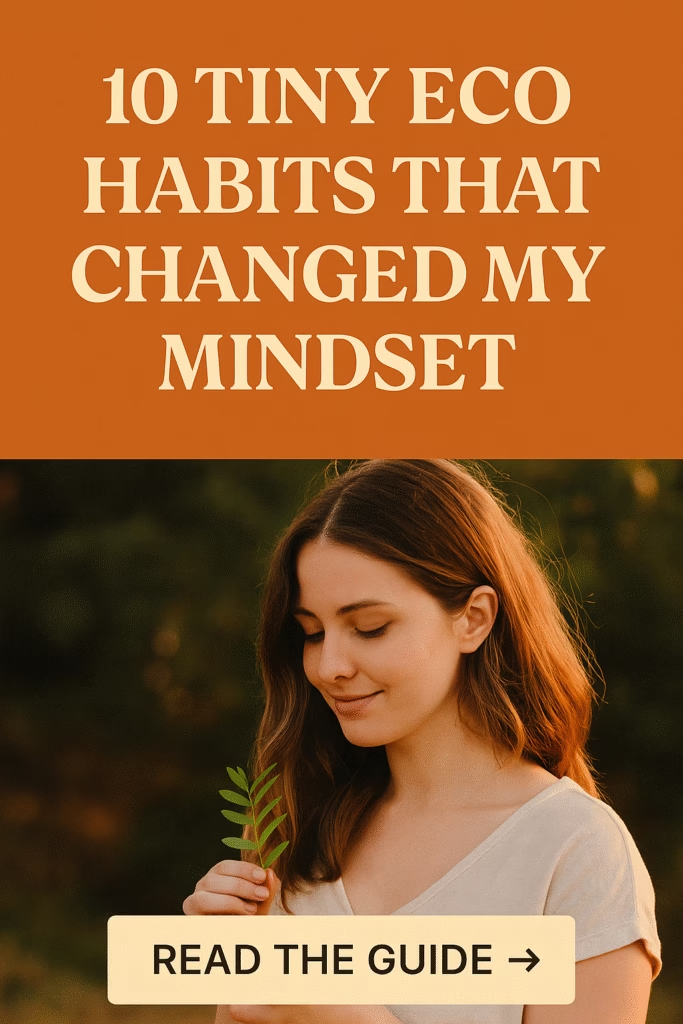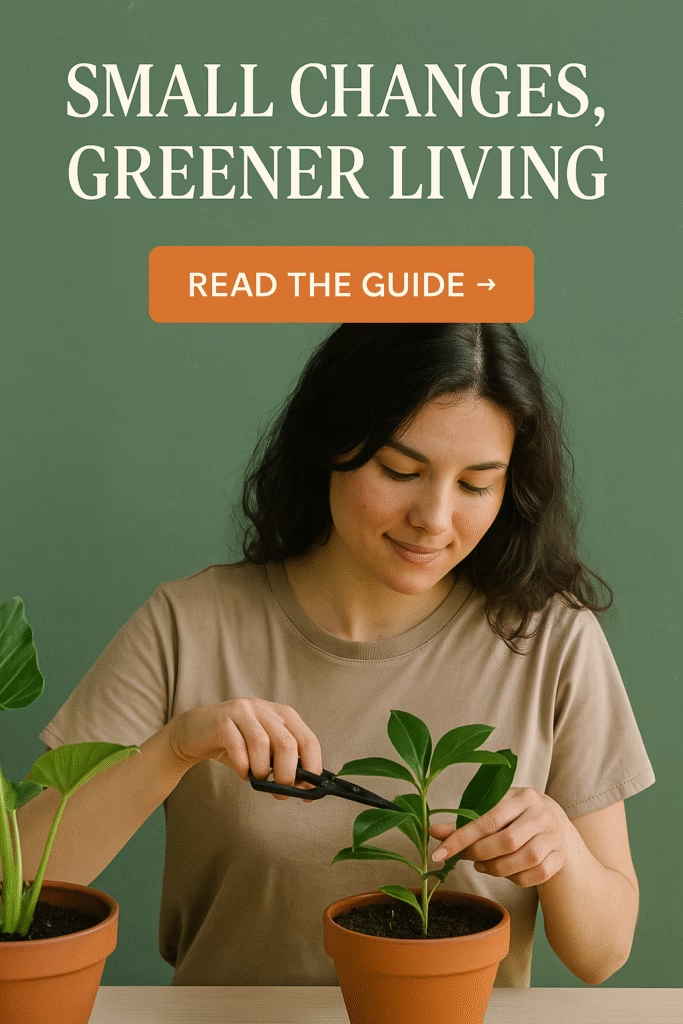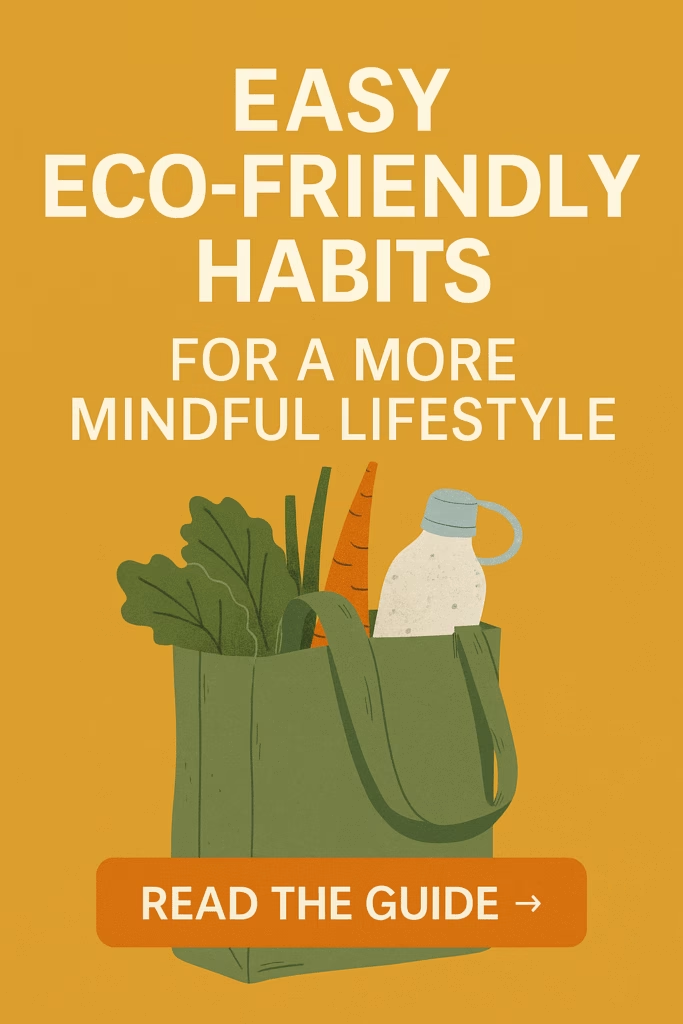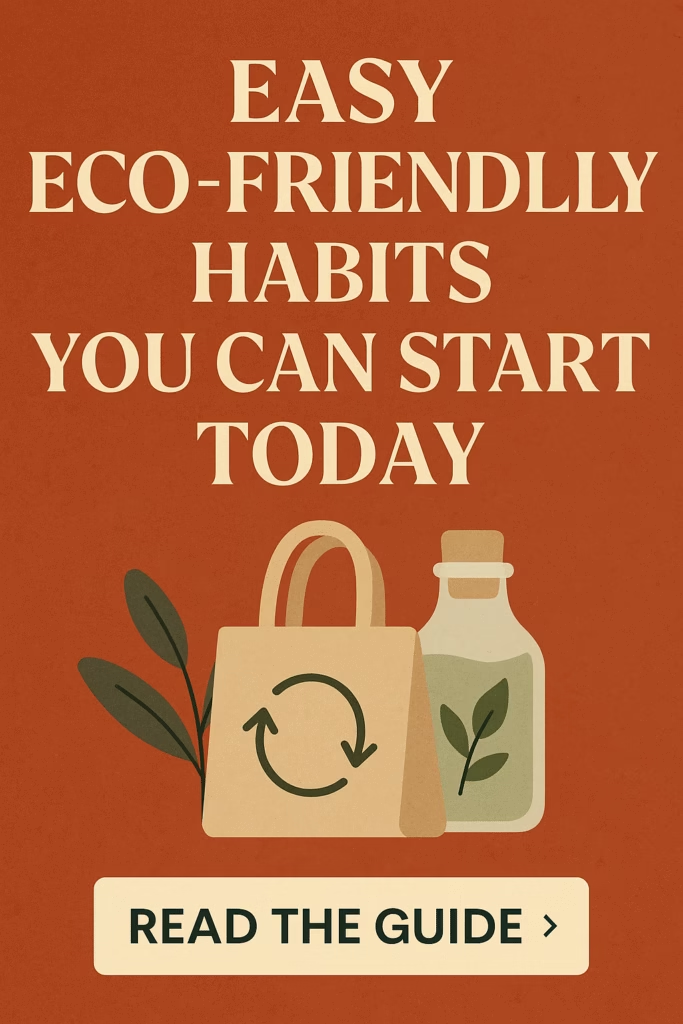
Table of Contents
Why Bother Going Green If You’re Already Exhausted?
If you’re already running on caffeine and vibes, why even think about eco-friendly habits, right? You’ve got deadlines, errands, and a brain that’s basically buffering 24/7. So why add one more thing to your mental to-do list?
Because here’s the thing: living sustainably and living mindfully actually go hand in hand. And once you make the switch, your life gets simpler—not harder.
I used to think I needed to overhaul everything at once. Spoiler alert: I didn’t. Small eco-friendly habits changed how I feel day-to-day—mentally, emotionally, and yep, even financially. Want in?
Let’s break it down together. You don’t need to grow your own food (unless you want to—go off, queen). You just need a few intentional tweaks.
1. Rethink Your Relationship with Stuff
Mindful Consumption Starts Here
Ever stared at your closet and thought, “I have nothing to wear” while being buried in clothes? Same. That’s the trap of mindless consumption.
Try this instead:
- Buy less, but better. Quality over quantity saves you money long term.
- Ask yourself before buying: Do I need this? Do I already own something similar?
- Unfollow influencers who make you feel like you’re always lacking.
Consumer guilt is real. But making peace with “enough” is a flex.

2. Embrace the Reusables (It’s Not That Hard, I Swear)
Plastic-Free(ish) Without the Panic
No, you don’t need to carry around a full bamboo kitchen set. But a few reusable swaps make a big difference:
- Reusable water bottle (mine’s dented and proud)
- Coffee tumbler (bonus: café discounts!)
- Reusable grocery and produce bags
- Silicone zip bags or beeswax wraps
These tiny changes reduce waste and save you money. Plus, they’re kinda cute.
3. Eat More Plants, Even If You’re Not a Vegan
You Don’t Have to Go Full Kale Cult
Look, I still eat cheese. But reducing animal products even a few meals a week has a huge impact.
Why it works:
- Plant-based meals have a lower carbon footprint
- They’re often cheaper (hello, lentils)
- You might actually feel lighter and more energized
Try “Meatless Mondays.” Or make one plant-based swap a week. Easy wins.
4. Declutter With Purpose (Not Just for Aesthetic Instagram Pics)
What You Own Owns You
Clutter is more than visual noise—it’s mental noise. And it often leads to buying even more stuff to feel in control. Vicious cycle, right?
Do this:
- Pick one drawer or shelf a week
- Ask: Do I use this? Does this add value?
- Donate or repurpose what you don’t need
Decluttering mindfully means being honest with yourself. No shame. Just less junk, more clarity.

5. Green Your Daily Routine Without Going Off-Grid
Small Habits = Big Results
You don’t need solar panels or a tiny house to live greener. Here are low-effort swaps that actually stick:
- Shorter showers. Time yourself for fun (or horror).
- Unplug devices when not in use. They drain power even when “off.”
- Switch to eco-friendly cleaning supplies. No harsh chemicals = fewer headaches.
- Wash clothes in cold water. Works just as well. Really.
Every little thing adds up. The planet—and your electric bill—will thank you.
6. Mindful Commuting: AKA You Don’t Always Need the Car
Burn Calories, Not Fossil Fuels
I get it. Public transport can be a vibe (and not always a good one). But walking or biking short distances adds movement into your day without a gym membership.
What to try:
- Walk or bike to local shops or appointments
- Carpool with friends or coworkers
- Use apps to map out public transport shortcuts
Bonus: more steps = more serotonin. And IMO, that’s worth the slight leg soreness.
7. Mindful Media & Content Consumption
Yep, Even Your Scrolling Habits Matter
Being eco-friendly isn’t just physical—it’s mental. If your brain is overstimulated from endless doomscrolling, you’re not doing yourself (or the planet) any favors.
Reclaim your focus:
- Set screen-time limits (shoutout to that “App Limit” feature)
- Follow creators who inspire action, not anxiety
- Read more offline—books, zines, labels, whatever
Being mindful with your time is a form of digital sustainability. No joke. Want to reset your habits from the ground up? Try our 7-Day Digital Detox Challenge for a gentle tech-and-mind refresh.

8. Vote With Your Dollar
Support Brands That Get It
But when possible, support businesses that align with your values.
Look for:
- Ethical production practices
- Sustainable packaging
- Transparent supply chains
Even shifting 10% of your spending toward responsible brands can make a dent.
9. Talk About It (Without Being That Person)
Normalize Mindful Living
No one likes a sustainability soapbox. But your choices might inspire others more than you think.
How to share without preaching:
- Post your plant-based dinner, not a rant about meat
- Recommend your fave reusable water bottle casually
- Offer tips when people ask (they will)
You’re not perfect (who is?), but your efforts matter.

10. Reflect Regularly (This Isn’t a One-and-Done)
Mindfulness = Awareness
Check in with yourself. What’s working? What feels forced? Sustainable living evolves with you.
Try this once a month:
- What habits feel easy now?
- Where do you feel resistance?
- What would help you stay consistent?
Write it down. Or voice memo it. Or rant to your group chat. Whatever works.
Final Thoughts: This Is About Progress, Not Perfection
You don’t need to grow all your own food, sew your own clothes, and live in a yurt to live mindfully. Unless you want to. In which case, please send pics.
But for the rest of us? It’s about making better choices, more often.
Small actions stack. And they lead to big shifts—in your environment and your mental space.
So go ahead: drink from your reusable bottle, light your eco-friendly candle, and compost like a badass. Your future self (and the planet) will be proud.
And hey—if you mess up? Same. Just try again tomorrow. That’s the real mindful lifestyle.
Now go forth and green your life—one conscious step at a time. 🌿
Need a little encouragement for your day?
Join our email list today.
As a thank-you, you’ll get 4 free printable affirmation cards.